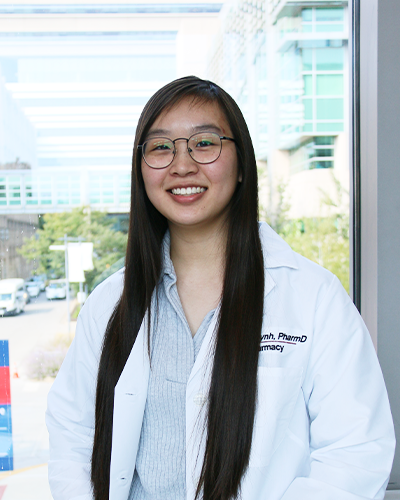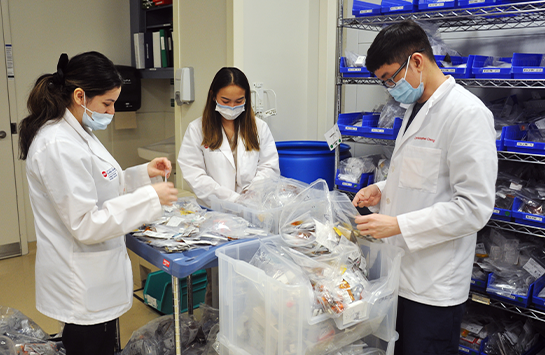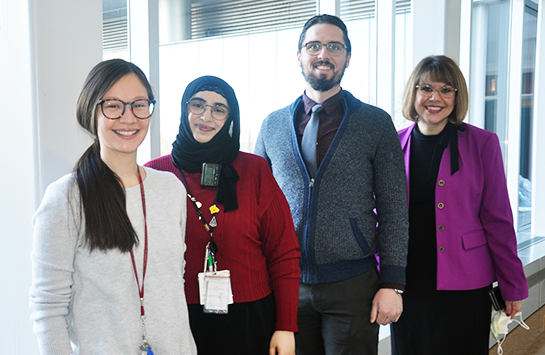Partnership Spotlight: University of Chicago Medicine

Intro

Joann Huynh, PharmD ’21, was born and raised in Chicago. Her parents, however, were not.
With parents hailing from two different countries, Huynh experienced both the joys and challenges of being a second-generation immigrant. Since neither of her parents are native English speakers, Huynh witnessed their communication struggles in many settings, including healthcare. One exception, however, proved so impactful that it directed her career choice.
“I would go to this mom-and-pop pharmacy with my dad once a month,” she recalls. “They took the time to explain things to us. I associated [those visits] with good public health practice and positive memories.”
Inspired by those recollections, Huynh went on to study global health as an undergraduate before earning her PharmD at UIC and is now in her PGY1 residency at the University of Chicago. Huynh says she selected UChicago Medicine (UCM) with an interest in working with multicultural communities, as well as quality instruction.
“Healthcare should be a right, but it’s sometimes treated as a privilege,” says Hyunh. “It’s about being able to use the resources that you have to work with a diverse population.” Being in multi-ethnic Hyde Park, UCM offers plenty of opportunity to treat a variety of patients. “I feel I should have exposure to different community environments to better serve people in the future.”
Huynh isn’t new to UCM. As a UIC Pharmacy student, and thanks to the longstanding partnership that the two institutions have developed, she had the opportunity to do two rotations there for her P3 and P4 APPEs.
“[UChicago] is a dynamic institution that is known for its high-quality healthcare,” says Dean Glen Schumock. “This creates a lot of beneficial opportunities for our students.”
Developing student expertise through the Longitudinal Advanced Pharmacy Program

One such opportunity is UCM’s Longitudinal Advanced Pharmacy Program (LAPP), a unique experiential education program in which pharmacy students undergo a minimum of four different rotations on site.
“The advantage is that [students] get better acquainted with the institution—the people, the layout, the infrastructure—and experience a variety of practice experiences in the same location, which allows them to be more capable of contributing at a different level,” explains Schumock.
As clinical manager of pharmacy education and director of graduate studies at UCM, Olabisi Falana, who claims that she’d be a teacher if she wasn’t a pharmacist, is continuously investigating departmental and institutional opportunities to enhance learning experiences for LAPP students.
One of UCM’s current initiatives involves a pharmacogenomics study among surgical patients, who are allowed to enroll in the study during pre-op. Participants are swabbed, and information is collected to develop pharmacogenomic profiles. Students then assess the data, which includes current medications, to determine an appropriate therapy for a patient’s disease state. Falana and another colleague then review and
sign off on recommendations.
“This is something that is rarely taught in a pharmacy school curriculum,” says Falana. “We’re giving students the opportunity to be involved in a life-changing practice that will be the norm in the next 10 years.”
As the LAPP coordinator, clinical pharmacist Hilary Sheridan is involved with every aspect of the LAPP student experience, including matching each student to a mentor for the duration of their time at UCM, which gives the pair an opportunity to build a relationship. The LAPP mentor advises students on goal-setting, residency program selection and even offers guidance through the residency application process, including CV preparation and sharpening interview skills. Sheridan herself has served as a preceptor since she started at UCM in 2015 and believes that the long-term mentorship aspect of LAPP is what sets it apart.
“Pharmacy is our profession,” says Sheridan. “Students are only going to be as good as their instructors. We all have a responsibility to make sure that new graduates are meeting certain expectations for our profession.”
“I would not be the clinician I am today if I didn’t have good preceptors, so we need to pay it forward.
Preparing students to succeed in any setting

Among UCM’s current preceptors are about a dozen UIC-trained clinicians who feel the same, including Sana Said, PharmD ’16, RES ’18, clinical pharmacy specialist in the pediatric ICU and one of UCM’s PGY1 residency coordinators. Like Huynh, Said was drawn to the profession by observing the relationships that her neighborhood pharmacists developed with the community during her childhood and subsequently discovered clinical pharmacy as a student at UIC. She was first introduced to UCM during a visiting rotation in pediatrics when her residency program director at UIC connected her with a colleague-friend at UCM. After finishing her PGY2, Said secured a permanent position in UCM’s pediatric intensive care unit.
“What’s interesting about UIC students is that many come in with background knowledge of pediatrics that other students don’t have,” she observes. “It’s always nice to expand on an existing knowledge base. It allows for
interesting discussion and learning.”
Patrick Costello, PharmD ’15, who attended the college’s Rockford campus, came to pharmacy after getting his EMT license and working as a pharmacy tech after undergrad. A clinical pharmacy specialist in critical care, Costello completed both his PGY1 and PGY2 at UCM and is now also a PGY1 residency coordinator.
“Being a pharmacist is where it’s at,” says Costello, who believes he has the best job in the hospital. “Everything I’m doing is adding value to the patient experience.”
Unlike Said, Costello often works with students who have no experience in his area of expertise.
“They sign up because they know what they’re getting themselves into,” he says, “which leads to motivated students and a big reward for me to witness their growth over time.”
As residency coordinator, Costello continues to be impressed by the applicants he sees from his alma mater. He estimates at least two UIC students each year match to stay on as residents and is grateful to continue working with them as they continue their training.
“I often wonder how it is that I got a residency here,” he says. “All the [UIC alumni] are rock stars. But I’m probably biased.”
Residency and beyond
It isn’t unusual for students who do rotations at UCM to apply there for residency and then join on as staff. Vice president and chief pharmacy officer Denise Scarpelli, PharmD ’96, calls it “succession planning.” In fact, she says half of her management team completed their PGY2 at UCM in advanced pharmacy leadership.
“We have an extensive learner program,” she says. “We take on students in many different ways, and we have a large residency program. . . . To us, it’s on-the-job training. We can see their strengths and weaknesses, and they learn about us.”
To that end, as UCM learns more about the resident and discovers his or her interest, she says, they tailor the resident’s training to allow more exposure to that particular area.
“We look at the residency program as building our [employment] pool, so we do try to offer positions to all the individuals who complete the program.”
Scarpelli, who served as UIC Pharmacy’s commencement speaker in 2021, worked at Walgreens for more than 20 years before joining UCM in 2017. Alongside her other roles, she precepts students in the Advanced Pharmacy Leadership rotation. To her, the UIC student stands apart.
“When you’re a preceptor who sees students from other schools, you see the difference. The UIC student is a highly skilled top candidate who knows the basics and more. There is a higher trust level of allowing that student more autonomy because we know the education they’re getting.”
The relationship between the two institutions isn’t limited to student and resident programming. Edith Nutescu, professor and head of the Department of Pharmacy Practice at UIC, praises UCM as one of UIC’s “premier partners, not only in the training of our students, but also in valuable relationships with several clinical pharmacists who collaborate with our faculty on practice, research, and teaching opportunities.”
Deb Bondi, RES ’18, for example, is pediatric clinical pharmacy coordinator and director of the PGY2 pediatric pharmacy residency program. She was attracted to UCM because she found the practice environment similar to what she enjoyed at UIC.
Last year, Bondi, along with one of her colleagues, was invited to return to UIC as an adjunct assistant clinical professor.
“Teaching is something that offers multiple levels of satisfaction,” she says. “The most obvious is watching the growth of the learner, but there are other ways that we [instructors] can directly benefit from learners.”
In the NICU, Bondi typically offers APPE students the opportunity to participate in data collection projects,
which can sometimes develop into full-blown research projects. Not only does the data inform her own work, she admits that she often finds herself learning from students about new treatments, populations she’s not familiar with, or even changes in practice methods.
Beyond the exchange of knowledge, however, lies a deeper and arguably more significant aspect of the collaboration between scientists and practitioners all fixed on a common goal. At the end of the day, they all share a priority – easily seen through the way it is integrally woven through the partnership that UIC and UCM share—that enhances the practice of pharmacy, and, quite likely, the living of life: building relationships.
Scarpelli herself recalls the impact that the close relationships developed by the corner pharmacist in her family’s neighborhood had on her community. Her desire to engage with patients in that same way is what led her to retail pharmacy. In her experience, UIC students arrive at UCM with a head start on that particular competency.
“We trust that they can communicate professionally with colleagues and patients,” she says. “They can be a valuable member of interdisciplinary teams and round with doctors and nurses. They are able to begin training at a higher level and can have knowledgeable conversations.”
As an example, Huynh so impressed Falana with her compassion and approach to patient care that Falana offered to be her mentor even after she finished her student rotations. Huynh took her up on the offer and followed up by coming in on her own time to shadow Falana on weekends and continue to learn.